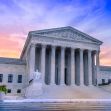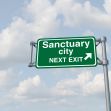On Monday, the Supreme Court refused to hear a complaint filed by Texas arguing that the State of California “unconstitutionally discriminated against Texans” by banning state-funded and state-sponsored travel to Texas. In the complaint, Texas argued that California is targeting states that “offer[] more protection for religious freedom than California believes is required by the First Amendment.”
In 2016, California’s Legislature passed Assembly Bill 1887 (A.B. 1887), prohibiting all state-funded or sponsored travel to states that enact specific discriminatory laws on or after June 26, 2015. State laws classified as discriminatory include legislation that voids gender- and sexuality-based protections, authorizes discrimination practices against same-sex couples or creates any anti-discrimination exceptions. An offending state is placed on the Attorney General of California’s public website as a banned travel destination.
The travel ban went into effect on January 1, 2017. The California legislature promoted the legislation by stating, “California must take action to avoid supporting or financing discrimination against lesbian, gay, bisexual, and transgender people.” The legislation is a tool to deter states from adopting anti-LGBTQ practices. Currently, 12 states are subject to the travel ban: Alabama, Idaho, Iowa, Kansas, Kentucky, Mississippi, North Carolina, Oklahoma, South Carolina, South Dakota, Tennessee, and Texas.
The travel ban does not apply to personal travel, and exceptions to the travel ban include any California State Employee traveling to audit for revenue collection, litigation proceedings, actions required to meet contractual obligations incurred before January 1, 2017, and any training for an employee to continue holding licenses required for their position.
Nearly six months after A.B. 1887 passed, California’s Attorney General added Texas to the growing list of banned states. In June 2017, the Governor of Texas signed into law the “Freedom to Serve Children Act” in House Bill 3859. That legislation allows state-funded adoption agencies and foster care agencies to reject families’ applications based on religious grounds. Critics of the bill argue that it is a direct target on same-sex couples wanting to adopt or foster children in Texas.
Texas argued the California law was unconstitutional, citing First Amendment rights and the Privileges and Immunities Clause of the Constitution. Attorney General Ken Paxton attacked California’s ban, calling the legislation an act of “enforcing economic sanctions against Texas, Texas citizens, and Texas businesses.” Paxton continues to attack California in the complaint by saying, “it is not enough to burden religion in California; it must go further and coerce other States to increase burdens on religion within their borders.”
The Privileges and Immunities Clause of Article IV, Section 2 of the United States Constitution states that “the citizens of each state shall be entitled to all privileges and immunities of citizens in the several states,” protecting citizens’ fundamental rights from state action to discriminate against out-of-state citizens.
Nineteen states, including Kansas and Tennessee - two other states banned from California state-funded travel - filed a brief of amicus curiae in support of Texas. The brief argues that the case should be heard by the Supreme Court because it “asks foundational questions about how States relate to each other as co-sovereigns – even when they advance diametrically opposed policy preferences.”
The Supreme Court did not give a reason for the denial. However, Justices Clarence Thomas and Samuel Alito dissented, wanting to allow the complaint to be considered by the high court. Thomas was appointed by President George H.W. Bush while Alito was appointed by President George W. Bush.






